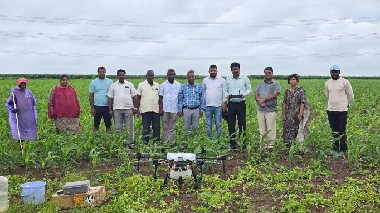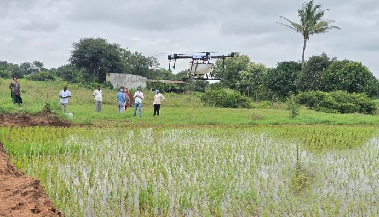26 August 2025, Hyderabad
An awareness programme and field day was organised today at Nedunuru village, Kandukuru mandal, Rangareddy district to create awareness among farmers about drone-based agricultural technologies, particularly drone spraying with nano-fertilizers. The programme was jointly organised by the Department of Agriculture, ICAR-Krishi Vigyan Kendra Rangareddy, and ICAR-Central Research Institute for Dryland Agriculture, Hyderabad.
The programme highlighted that drone technology is not just a spraying tool, but a transformative innovation that addresses several challenges faced by farmers. It was emphasized that drones ensure timely input application even in adverse field conditions, reduce dependence on manual labour, protect farmer health by minimizing direct exposure to chemicals, and enable precise input management, thereby saving resources and improving nutrient use efficiency.

The benefits of drone spraying were discussed in detail, including uniform coverage of fertilizers and pesticides, equal treatment to every part of the crop, and significant savings in time and effort. Large areas can be covered within minutes as compared to the many hours required with manual spraying.
The role of nano-fertilizers in different crops was also explained. In rice cultivation, nano-fertilizers were noted to strengthen plant health and enhance natural resistance to pests. Their slow and controlled release mechanism helps reduce nutrient loss caused by leaching and runoff in water-intensive crops, ensuring consistent nutrient availability throughout the crop cycle.
In maize, the importance of applying nano urea during the active vegetative stage (25–30 days after sowing) for strong growth and leaf development was highlighted. A second spray during the tasseling to silking stage supports grain filling and improves final yield.
The potential of drone spraying in crops like rice and cotton was also discussed in the context of scaling precision agriculture. Drones were highlighted as tools that provide accurate, uniform, and timely application of inputs, thereby reducing wastage and optimizing resources. This enables small and medium farmers to adopt precision farming practices, improving productivity and sustainability.

The programme also facilitated interactions with farmers on government support schemes, subsidies, and training opportunities for adopting drone services and nano-fertilizers. Farmers were encouraged to gradually integrate these technologies into their practices with the assurance of continuous guidance from the Agriculture Department.
Live demonstrations of drone spraying with nano fertilizers were conducted in farmers’ fields, with seven farmers (four maize and three rice growers) directly participating in the activities.
In total, around 30 farmers attended the programme and actively took part in discussions and demonstrations.
(Source: ICAR-Central Research Institute for Dryland Agriculture, Hyderabad)








Like on Facebook
Subscribe on Youtube
Follow on X X
Like on instagram